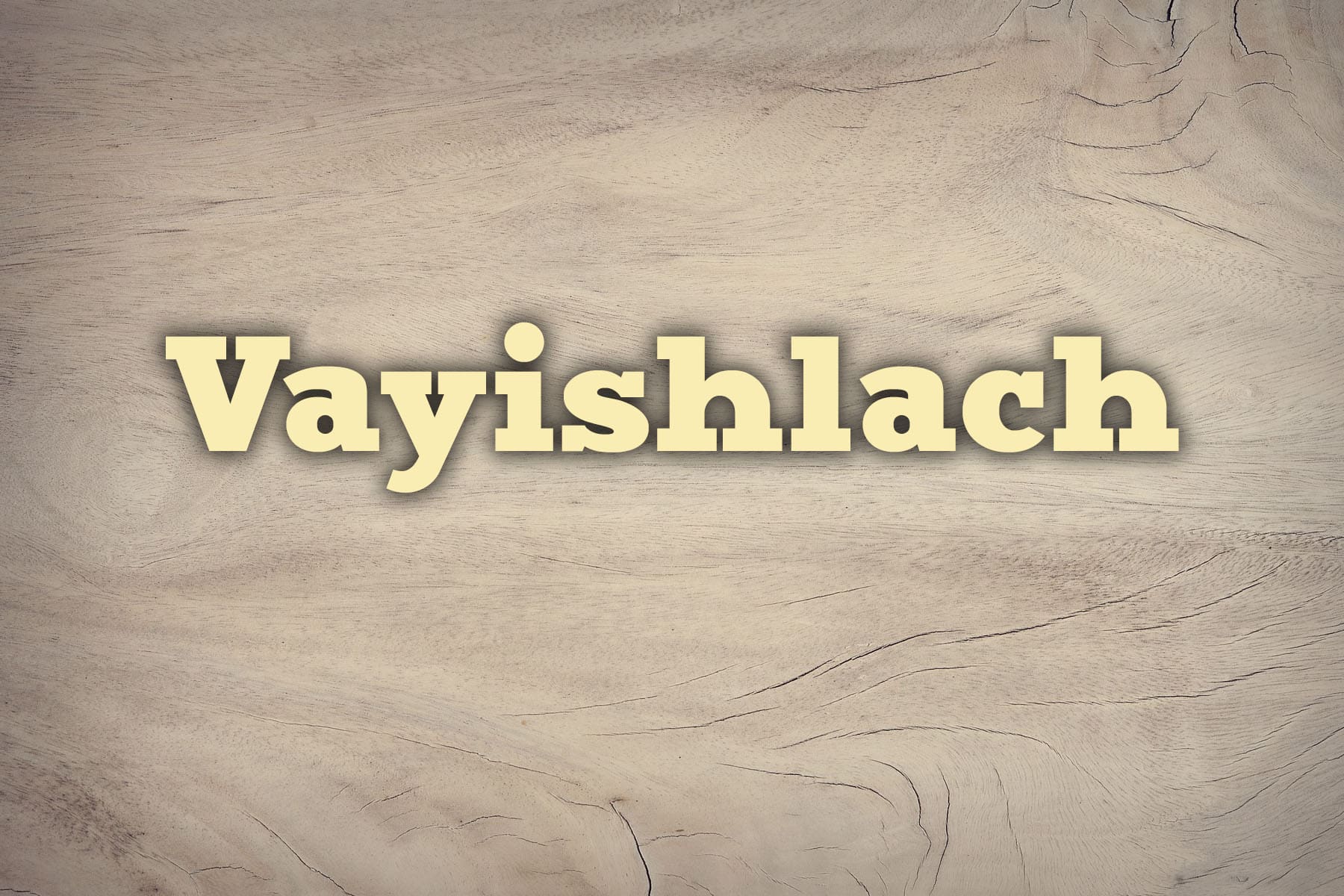
One verse, five voices. Edited by Salvador Litvak, the Accidental Talmudist
When he saw that he could not prevail against him, he touched the socket of his hip, and the socket of Jacob’s hip became dislocated as he wrestled with him.
– Gen. 32:26
Kira Sirote
Author of “Haftorah Unrolled”
The email telling me which verse to comment upon appeared in my inbox as I was leaving a physical therapy session for an injury to my hip. I was limping as I looked at my phone — when you can’t rely on your hip for stability, you can’t sit, you can’t stand, you can’t walk.
How did Yaakov carry on fighting after that? How did he not give up? What happened between that moment when his hip could no longer support him, and the next verse, when the angel begs him to let him go? We do not know. Somehow, he held on.
The Ramban (Moses Nachmanides) claims that the achievements of our ancestors created reservoirs of power that we, their descendants, are able to draw on. For this verse, he points to the generation of the Mishna, who endured horrible persecutions, and to later generations that suffered even worse, yet endured and prevailed. By the time Yaakov gets to Shechem, he is whole.
Yaakov recovered from his ordeal and his injury. Still, his children instituted a custom that reminded them of the time their father was limping — never to eat the corresponding sinew of an animal (Gid HaNashe), and that is our tradition to this day. We heal, we carry on, but we remember.
Once again, the Jewish People have suffered an injury to our core. Using the power bequeathed to us by Yaakov Avinu, we will heal, we will carry on, and we will remember. Together, we will prevail.
Rabbi Gershon Schusterman
Author of “Why, God, Why?”
Jacob’s encounter with a heavenly being in a human form is shrouded in mystical mystery. Weaponless and silent, they wrestled late into the night as Jacob’s attacker tried to subdue him. As dawn broke, the attacker, realizing that he could not take Jacob down, touched Jacob’s hip and dislocated it, saying, “Let me go, for it is dawn.” But Jacob would not release him until he extracted a blessing. The angel blessed Jacob saying, “No longer will it be said your name is Jacob, but Israel, for you have striven with the Divine and with man, and you have prevailed.”
The stranger was Satan, the guardian angel of Esau, Jacob’s twin brother. Jacob, the patriarch of G-d’s people, and Esau, the progenitor of evil, were in a struggle that is the eternal battle between good and evil. In every generation and in each individual, the Jacob within us cannot be defeated by evil even if the fight goes on all night. Rather than wearying, Jacob accessed his G-dly resilience and fought on, until he elicited from Satan himself the acknowledgement that he had prevailed. Thereon after, just as Jacob did not capitulate then, so too, Jacob’s descendants, Bnai Yisroel, are assured that we will ultimately triumph.
The Torah’s story concludes, “And the sun rose for him [Jacob] and healed him from his limp (Rashi).” With our collective soul’s tenacity, the sun shall rise for us too, eradicating the vestiges of evil, healing our nation’s wounds, and ushering in Mashiach’s redemption.
Rabbi Tal Sessler
Temple Beth Zion
The story of Jacob dislocating his hip as he struggled with an enigmatic stranger epitomizes the human spiritual capacity to grow beyond mere resilience.
Resilience means that I remain intact and unscathed following an external challenge. That I retain and preserve my original state despite pressure and adversity. Going beyond mere resilience is a hallmark feature of the Jewish condition. We not only persevere, we soar from brokenness. Brokenness is what gave rise to the creation of the cosmos according to the Kabbalistic cosmology of the broken vessels, and the brokenness of the original set of the Ten Commandments was preserved in the Ark of the Covenant, in order to remind us of the redemptive virtue of growing and healing after brokenness. The Torah states that Jacob arrived in Israel physically intact, as an “ish shalem,” an integrated person. According to Rashi, this means that Jacob healed from the injury incurred earlier during the nocturnal struggle.
Human biology teaches us that muscles tear before they grow. The same holds with regard to the human spirit. This is exemplified by the Japanese art of Kintsugi, in which we put broken pottery pieces together with gold. This exquisite art form symbolizes, beyond its aesthetic virtues, the ability to redeem and beautify our own internal brokenness. After all, this is what Israel, our ancestral spiritual namesake achieved, when he arrived back in Israel as an integrated person, and this is what we, at our finest moments, have been teaching the world ever since.
Niva Taylor
Freelance Writer
Who is this man with whom Yaakov wrestles? Our Sages tell us it is none other than Esav’s ministering angel, who has come, if not to uproot Yaakov from the world completely, at least to weaken his footing. This wrestling match, asserts Rabbi Samson Raphael Hirsch, is the prototype for a cosmic struggle that has replayed itself throughout history.
The Torah tells us that Yaakov Avinu was wholesome, dwelling in tents — the tents of Torah study, Rashi says. His was a life of steadfast devotion to Hashem. This singular focus on fulfilling God’s will, maintains Sforno, enabled him to prevail that night. By toiling in Torah, Yaakov had perfected his character, rendering himself almost indistinguishable from an angel, and impervious to harm. Says the Baal HaTurim, Yaakov’s adversary struck his hip to discern whether he was indeed a human being with physical vulnerabilities!
The spiritual heights Yaakov reached are a portent for what we, the Jewish people, can also accomplish. Throughout the ages, our enemies have attempted to divert us from our mission of spreading G-d awareness to the world. But we are Yaakov’s progeny; they can never extinguish the flame of Torah within us.
On Oct. 7th, Hamas may have succeeded in inflicting devastating harm. Like Yaakov Avinu before us, we are injured and limping. But we will triumph. From the battlefields of Gaza to the halls of the EU, the truth that Yaakov’s children declared on his deathbed remains on our lips: Shema Yisrael Hashem Elokeinu, Hashem Echad.
Ilana Wilner
Ramaz Upper School
In our parsha we read the pivotal moment when Yaakov’s “gid hanashe,” or thigh sinew, is struck by a divine being with whom he wrestles. This encounter serves as a powerful metaphor for the intersection of struggle and spiritual growth, resonating with the complexities of our modern lives. Ramban sheds light on the spiritual dimensions of this encounter. He explains that the dislocation of Yaakov’s gid hanashe symbolizes the Jews’ vulnerability in exile, emphasizing the struggles and challenges they would face throughout history. To me, Yaakov’s wrestling match represents the delicate balance between tradition and the evolving needs of a modern world. The gid hanashe, strained as it may be, becomes emblematic of the tensions inherent in navigating the intersection of timeless Jewish values and the demands of the present. Ramban’s commentary suggests that, like Yaakov, we are challenged to confront discomfort and adapt to the evolving nature of our faith and relationship with God. The refusal to release the hold without a blessing underscores the resilience required to engage with the complexities of our modern lives while seeking the profound blessings that emerge from these struggles. We are called to embrace this tension, recognizing that the wrestling match between tradition and modernity is not a sign of weakness but an opportunity for growth. The gid hanashe, strained yet resilient, becomes a symbol of our ongoing spiritual journey, navigating the intricate dance between our rich heritage and the dynamic realities of the contemporary world.






















 More news and opinions than at a Shabbat dinner, right in your inbox.
More news and opinions than at a Shabbat dinner, right in your inbox.